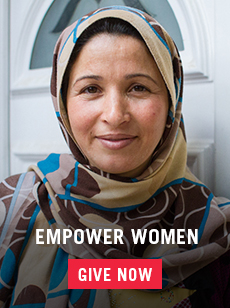It’s interesting how my perspectives on people who are different than me have changed since the run-up to the Iraq war in 2002.
I remember sitting rapt in front of the television watching Hans Blix look for weapons of mass destruction. I remember skipping class one Tuesday afternoon and watching coverage of the war, the fall of Baghdad, and the subsequent “Mission Accomplished” speech. I distinctly remember the Sunday night that news of Saddam Hussein’s capture interrupted my weekly viewing of Alias – a spy show that no doubt fed my ambivalence toward the very real people of Iraq.
But when I visited Iraq for the first time three years into the war, at the height of the sectarian violence, I was entirely unprepared for how much I would actually care about the people of Iraq; how much I would be moved and changed by their story.
The single greatest change in my life between that night when we saw Saddam groveling in a hole and the night that I wept bitterly in Kirkuk over nemesis neighbors bent on killing one another was the birth of my little girl, Emma. I wasn’t ready to be a dad. I loved my young-married life with my wife. She was all I had dreamed about and I loved our freedom. We traveled the world together, listened to music that was actually cool, read books with big words, and enjoyed many long walks and talks without interruption each week. All of that was severely threatened when we found out we were pregnant. I was excited, but certainly scared – mostly about what bearing this new child would have on our marriage. I wasn’t ready to give up freedom and travel for monosyllabic books like See Spot Run. But that first day in Dr. Hidayet’s office when we heard Emma’s heartbeat… that was a life-changing moment! And as they wheeled my wife away a few months later on a gurney beyond those double doors in Istanbul, Turkey I was terrified that something would go wrong in this foreign country.

I was actually in the room for my daughter’s birth. I held her within seconds of her first breath. And one of the most amazing moments of my life was the first minutes we had alone together in a Turkish corridor as all the chaos of the hospital disappeared and I watched my daughter look at me for the first time. I guess my point is this: becoming a father changed me.

So when I arrived in Iraq with my daughter and my wife in 2007, I was not the same person who had watched the news on Iraq with disconnected interested years prior. I was a father now. And with that came a special code of conduct – a code that transcends culture. I didn’t see “Iraqis” or even “Muslims”. Arabs weren’t “rag heads” like some of my friends and family had suggested. Kurds were not these disempowered mountain Turks that I had grown up seeing with Klashnikovs on CBS News in 1990.
I mostly just saw fathers. Most of the media coverage of our work in Iraq suggests that we are caring for the children of Iraq, healing their hearts, and creating a better future for them. I certainly agree. But I have a slightly broader agenda: I see myself as caring for the fathers of Iraq. I’ve sat by too many dads as they’ve tried to choke back tears in hopes of remaining strong and faithful to the belief that God is in control. I hate that sound – the sound of grief choking.
So I work each day to care – not only for the children in Iraq – but for the fathers in Iraq, as well. Because I am one.
And my caring has actually made me a better father for my own children. As I consider each day how many of my father-friends have lost their little boys and girls, it helps me value every minute I have with my children more deeply. Caring for the fathers of Iraq helps me remember what a blessing my children are to me. I came home from work a little late last Thursday night and spent an extra hour laying in bed with my son telling stories, tickling, and dreaming up imaginary exploits that Batman and Superman together would be afraid to touch – but not us! I spent this extra time with my son because I had a need that only he could fill for me. I didn’t think I was doing him a favor. I was keenly aware that he was making me whole, filling up what was lacking in me after a long day of working for other fathers and their little boys.
The bio sketches of our organization and my role in it will probably continue to talk about the way we’ve changed Iraq by establishing lifesaving heart hospitals across the country through our Remedy Missions. But the truth is even more profound. I am now connected to the people of Iraq as a father and a friend; as a big brother and an uncle that works joyfully in hopes that other people from around the world will come to love them as I do. I’m not sure yet what my legacy in Iraq will be – if anything. But Iraq’s legacy in the life of my family is clear.
This Father’s Day we celebrate how the dads of Iraq have shaped our family and how loving them has brought us closer.

